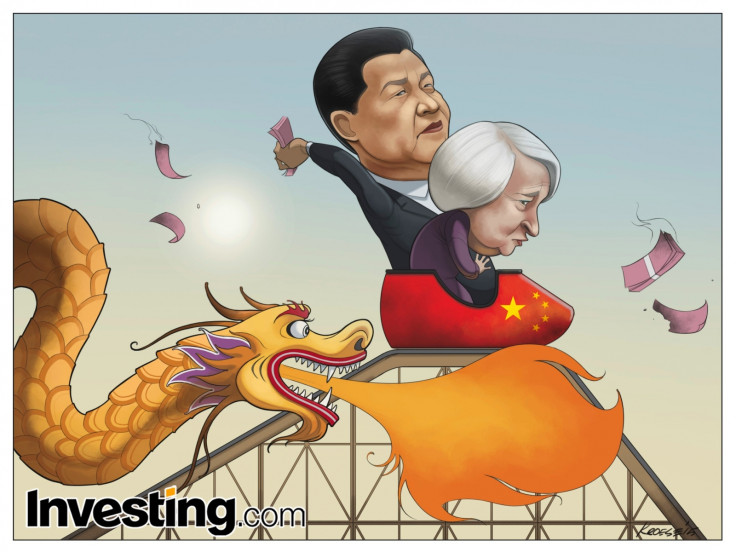What are the global implications of China's economic slowdown?

China's economic slowdown is beginning to be felt across the globe. The FTSE has fallen 10% after hitting record highs in April, numerous companies are starting to report falling sales and some are even warning of a global recession – all linked to slowing growth in the world's second largest economy.
China is targeting growth of 7% in 2015, down from 7.4% in 2014, as the country attempts to move from an export-led economy to one more focused on consumer spending. Earlier this year, investors reacted by embarking on a selling frenzy that wiped out more than 30% – some $3tn (£1.9tn, €2.7tn) – of China's equity market value in one month.
The Chinese government responded by injecting billions into blue chip stocks and, more recently, by devaluing its currency. IBTimes UK looks at what all this means for the rest of the world.
Imports
China is the second-largest economy in the world - it contributed 38% to global growth in 2014 - so when its growth slows, so does the rest of the world's. More pertinently, stalling growth in China directly affects a number of economies that trade heavily with China. According to the World Trade Organisation, China imported $123bn worth of goods from the US in 2013, $194bn from Japan, and $211bn from the Eurozone.
Jane Foley, senior currency strategist at Rabobank, believes that these numbers suggest that slowing in demand in China will have far reaching implications. "Many other economies count China as a first or second largest export partner. These include Australia, New Zealand, Brazil, Indonesia, Malaysia and South Africa. Many of these are producers of commodities of which China is the largest global consumer," said Foley.
"The current supply gluts in commodities such as oil, iron ore, coal and dairy has already blown a harsh wind over the economies of commodity producing countries, in particular those in the developing world." Emerging market economies dependent on trade with China, many of which have existing structural problems and are dogged by political uncertainty, could be among the worst hit, according to Foley.
UK and US
The Conservative government has made a point of trying to ramp up trade with China, and stuttering growth is going to do nothing to help British exports to the country. A number of UK firms, such as Burberry, Ted Baker and Jaguar do lots of business in China, so could also be hit.
On a macro level, a stalling Chinese economy, and the global repercussions that come with it, may affect interest rates in the US. With encouraging growth signs, many experts were forecasting a September hike. However, minutes of the Federal Open Market Committee from 28-29 July show that China is a concern.
They state: "While the recent Chinese stock market decline seemed to have had limited implications to date for the growth outlook in China, several participants noted that a material slowdown in Chinese economic activity could pose risks to the US economic outlook."
Some experts now believe that ruptures in China, in particular the weakening of the Chinese currency, will make it less likely the Federal Reserve will lift interest rates in September.
Investors
The reaction from investors has been to sell out of Asian stocks, causing bourses on the continent to plummet. According to research from NN Investment Partners, the extent of capital flight has risen to $US1tn over the past 13 months, double the amount that left during the financial crisis. However, there are many investors who are unperturbed.
Didier Rabattu, head of global equities at Lombard Odier Investment Managers, said: "The risk of a full-blown financial meltdown in China remains low in our opinion, especially given the strong firewalls available to the government which can prevent such a scenario.
"The slowdown in Chinese growth is nothing new and has been in play through subdued commodity prices in recent times. We continue to believe China started its soft landing in the second quarter of 2014 and that the process is continuing."
© Copyright IBTimes 2025. All rights reserved.






















